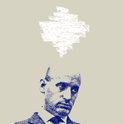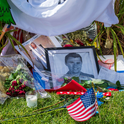Defending the Northwest passage was an easier job in centuries past. The impenetrable Arctic ice kept everyone out until 1906, when Roald Amundsen finally conquered the passage.
More recently, however, a warming climate has made the idea of a circumpolar shipping route a real possibility. It has been speculated that the Northwest passage could be open for commercial traffic in as little as 15 years, nearly halving the distance by ship between Tokyo and London. For Canada's new Conservative prime minister, Stephen Harper, that means more effort is required to keep it Canadian.
Long-standing US policy holds that navigable straits such as the Northwest passage are international waters—and the US ambassador to Canada has taken pains to remind Canadians of this in recent months. It is a position that has earned him sharp rebukes. "We will defend our sovereignty over all our territory—including the islands, waterways and resources of the high Arctic—even if that conflicts with US claims," Harper told the Economic Club of New York in September.

Such strong and direct positions have come to characterise Canadian foreign policy under Harper's leadership. After a generation in which Canada's international relations rested on soft power and multilateralism, a much more robust Canada is emerging on to the international stage.
Stephen Harper has been in power for less than a year, and his minority Conservative government could fall at any moment. Yet he has surprised critics and supporters alike by the speed with which he is redefining Canada's international image. He has strongly aligned himself with the war in Afghanistan, signing Canada up for a more aggressive and lengthier role. The 2,300 troops engaged in the "bandit territory" around Kandahar represent Canada's biggest overseas deployment since the Korean war. In a departure from the typical Canadian peacekeeping role of the last 25 years, Canadian military leaders have asked to fight in a danger zone, and have suffered 39 fatalities since August 2005.
The new administration in Ottawa has also repudiated the Kyoto protocol, backed Israel and presented the Dalai Lama with honorary Canadian citizenship, giving China a slap over its human rights record in the process. As Harper told the Economic Club: "Make no mistake: Canada intends to be a player."
Despite his strong words on the Northwest passage, Harper has also set about repairing relations with the US. He was able to negotiate a softwood lumber trade deal, settling a long-festering and expensive dispute between the two countries that had confounded the previous Liberal administrations of Jean Chrétien and Paul Martin. He has worked to establish a cordial personal relationship with George W Bush, abandoning the frequent anti-American stances of Liberal regimes.
Whether all this is a good thing or not depends on your political perspective and ideas of Canadian character and identity. "We have seen major improvements over the past year," says Michael Hart, a trade expert at the Norman Patterson School of International Affairs in Ottawa. "Adults are finally in charge."
For fans of the old Canadian traditions, the new stance is perplexing. Robert Wolfe, a politics professor at Queen's University in Kingston, Ontario, laments the new asymmetry. "They scold China on Tibet, yet you would never catch Harper making nasty comments about Guantánamo," he notes. Harper's stand-offish approach to the EU—he declined a summit in November with EU leaders, because of disagreements over Kyoto—also worries Wolfe, who recalls that longtime Liberal prime minister Pierre Trudeau (1968-79, 1980-84) worked hard to build EU relations as a means of diversifying Canada's foreign policy away from the US.
And yet with his bolder expressions of Canadian interests and strong support for the military, Harper may simply be winding the clock back past Trudeau to a more muscular time for Canada. At the end of the second world war, for instance, Canada had the third largest navy in the world, 1m men in uniform and a strong bond with the US. This gave the country an outsized influence on world affairs. Only during the Trudeau era did Canada's approach to foreign policy become so marked by the emphasis on soft power.
"However shocking it may seem, the relationship with the US is the only one that matters for Canada," stresses Hart. "And we have lost a lot of influence in Washington over the years." The two countries are the largest trading partners in the world, and their security is tightly interwoven. Solidifying Canada-US relations is thus the foundation for a coherent foreign policy.
Where previous Liberal governments often defined Canadian policies simply as the opposite of whatever the Americans were proposing, Harper has the confidence to express an independent Canadian view. His personal and party policy tendencies largely overlap with American positions on issues of trade, western values and international security—all of which will inevitably give him more clout with the White House. But that doesn't mean he won't feel obliged to disagree on other matters, such as the defence of the Northwest and Head Harbour passages.
At the same time as Harper maps out a more aggressive international projection of Canada, however, his internal concept of Canada is becoming blurred. In an effort to outflank separatist forces in Quebec, Harper recently steered a controversial motion through the House of Commons recognising that the Québécois "form a nation within a united Canada." Explicit recognition that Quebec's unique social, cultural and political traditions constitute nationhood may eventually damage Harper's foreign policy. It could, for instance, lead to multiple Canadian viewpoints and an undermining of the legitimacy of national symbols and beliefs. Quebec's government has long demanded its own voice on certain international issues, such as support for the Kyoto protocol, and its new "nation" status may embolden these claims.
And yet it appears Harper will pay no political price for his move. His chief rival is the newly minted federal Liberal leader Stéphane Dion, who in early December narrowly defeated Michael Ignatieff, the pro-Iraq war former academic, for the Liberal crown. Dion also supported the Quebec nationhood motion. So if Harper can turn his recognition of Quebec as a nation into increased political support from that province, he will be well on his way to a big majority in the next election—giving him the time and political capital necessary to complete his remaking of Canada's place in the world.











